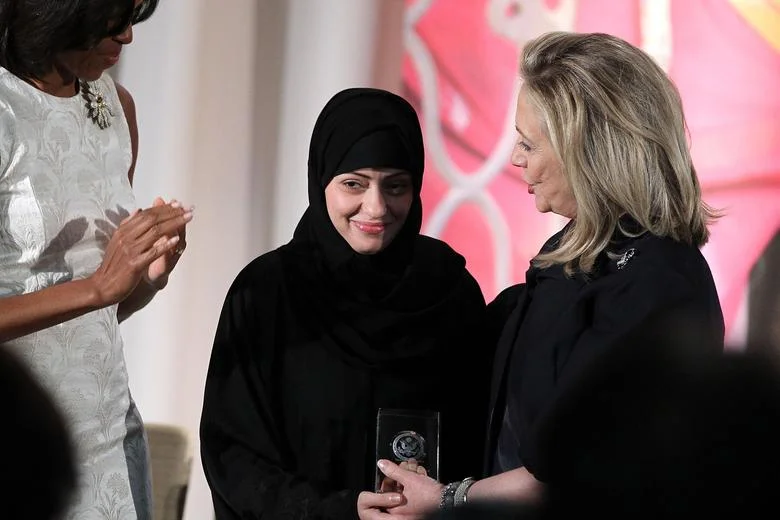Samar Badawi + Brother Raif Badawi Remain In Saudi Arabia Dhahban Central Prison, As Saudi Arabia Disallows Any Dissent
/Political activist Samar Badawi is presented with an International Women of Courage Award by U.S. Secretary of State Hillary Clinton as first lady Michelle Obama looks on during a ceremony at the State Department March 8, 2012 in Washington, DC. Alex Wong via Slate.com
Coming to grips with the horrors of Saudi Arabia’s torture of women’s activists at the same time Mohammed bin Salman bin Abdulaziz Al Saud — or MbS — lifted the ban on women driving in the kingdom is no more complicated than following the daily mental machinations of Donald Trump.
Jailing the Saudi women activists behind the women driving campaign seems irrational, but only if one fails to understand that machinations are not rational thought processes. Perhaps this is why MbS and Donald Trump have such a lovefest. It takes a self-absorbed schemer to know one, which is precisely why they end up so often hanging out together as the world’s leading autocrats.
Updating AOC two days ago about the jailed women’s activists, I zeroed in on the name Samar Badawi, knowing her to be the sister of jailed liberal blogger Raif Badawi. In 2015 Raif was sentenced to 10 years in prison and 1000 lashes for his writings. After receiving the first 50 lashes — which nearly killed him in front of the entire world — Raif Badawi has languished in Saudi prison.
Women activists arrested in Saudi Arabia include Loujain al-Hathloul, who I considered to be a major face behind the driving ban. Samar Badawi has campaigned for years against the most discriminatory of all the Saudi laws against women’s rights — as if it’s possible to enumerate them in order. Badawi opposes against the male guardianship system, under which women require the permission of a male relative to travel, marry, or work in certain jobs. In this article ‘Saudi Arabia: Where Fathers Rule and Courts Oblige’, Human Rights Watch details the mutual litigation of Badawi and her father against each other.
It was for this work that Samar Badawi received the US State Department International Women of Courage Award in 2012, when Hillary Clinton was Secretary of State. Note that Waleed Abu-al-Khair, Samar’s former husband and Raif Badawi’s lawyer, is also jailed for 15 years.
Writing for the New York Times in December 2018, Katherine Zoepf reported on her November 2015 visit to Saudi Arabia and time spent with marketing consultant and human rights activist Fahad al-Fahad. Referencing the unwillingness of Donald Trump to indicate any willingness to hold Mohammed bin Salman bin Abdulaziz Al Saud — or MbS — responsible for human rights abuses, especially in light of the assassination of Jamal Khashoggi, Zoepf says that the crackdown on dissent in Saudi Arabia is worse than it’s been in decades.
But despite continuing anger over Mr. Khashoggi’s fate, too little attention is being paid to the crown prince’s treatment of dissidents inside the kingdom, who often lack the resources to consider lives in exile, and who are now being imprisoned in record numbers. More than 2,600 Saudi dissidents, including prominent scientists, writers, lawyers and women’s rights campaigners, are in detention in Saudi Arabia, according to Prisoners of Conscience, a Saudi group that tracks political prisoners. Most were convicted under the kingdom’s counterterrorism laws, receiving sentences for such nonviolent offenses as “criticizing the royal court” and “ridiculing religious figures.” Few of these people are as well known in Western capitals as Mr. Khashoggi was, but their stories are no less important.
Saudi Arabia was not always like this. Viewed from afar, Saudi kings may look like one long, undifferentiated line of autocrats. But the degree to which dissent is tolerated has fluctuated over time, depending on the temperament of the ruler and the pressures he faces.





















































